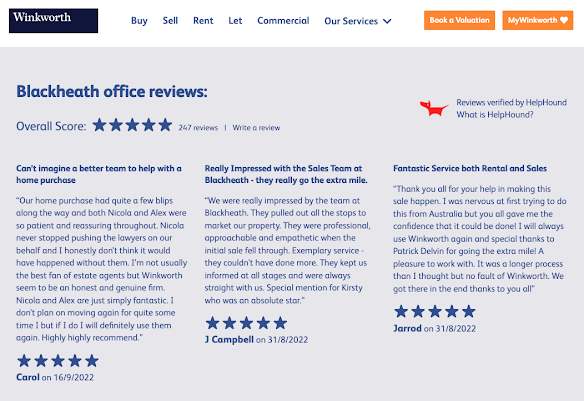We've already established in the previous article that scoring 4.0 on Google will leave a business languishing at the bottom of the Google rankings in most business sectors, certainly in the sectors that are key for professional businesses: financial, medical, legal, estate agency, recruitment etc. To even begin to make the top 5 in local search a business needs to score 4.7 or more.
Now let's look at the solutions many businesses in these sectors are currently adopting in order to achieve such scores.
1. Cherry-picking
Everyone's favourite: simply hand-pick happy customers and then invite them, and only them, to write a review. How do we know? Easy. It took us less than a minute to find this example and then about the same amount of time to establish that this law firm is cherry-picking by analysing the pattern of its reviews: out of a total of 46 reviews five are older than 3 years and two - both rating it 1* - were posted after 2019. It almost certainly cherry-picked its happy clients in 2018, achieved a perfect 5.0 with 44 reviews and hasn't asked anyone for a review since then.
And - be sure - if we can tell so can the CMA. Cherry-picking is illegal.
2. Gating
Really just a sophisticated version of cherry-picking: send a questionnaire out to every customer asking them to rate the business and then only invite those who respond with 10 out of 10 or 5 stars to write a Google review.

There's a variant that involves using one of the diminishing band of review sites - get the customer to write a review there and then only invite those who have posted a 5* review to the review site to copy that review to Google.Again: illegal.
3. A moderated system
Moderation: 'the act of having an independent agency read and check every review before publication' is the only sure-fire - and legally compliant - way of ensuring a business looks as good as it deserves.
Why? Because moderation focuses on identifying reviews that contain errors of fact and statements likely to mislead the reader.
And, by their very nature, those kinds of reviews also tend to be ones that carry the 1* ratings. If they can be corrected before publication, then the business's score will rise.
There's a reason we are able to drop the anonymity of the business above: that's because they are fully compliant with the law - the CMA regulations. They don't cherry-pick and they don't gate. They are able to sleep at night for two crucial reasons: they don't fear the CMA will come knocking and they know that unfair, inaccurate or misleading reviews will benefit from moderation.
We often meet people who say 'but we can respond to our Google reviews and correct errors of fact and any misconceptions then'. So you can, but by then most of the damage is done: the score is set in stone (as well as the impact it has on the business's overall score), irrespective of your response (Google* won't change it, even if you have cast iron proof that the review is in error); as well as that the harmfully and unfairly negative review will stand and will be read by your prospective customers.
Why not just invest in moderation and that concern - and the potential harm caused by a factually incorrect or potentially misleading review - goes away?
*Appealing against a Google review. In short: unless the review has contravened one of the following...
...you will struggle. That doesn't mean you shouldn't appeal, we conduct Google appeals on behalf of clients on an almost daily basis and are sometimes surprised when one that does not fit neatly into one of the categories in the above checklist succeeds, but you will note that the following are not prima facie grounds...
- errors of fact
- misleading statements
...and that's exactly why moderation is so valuable.
Results
We estimate that our clients score between 0.2 and 0.5 more on Google than if they had simply gone it alone - compliantly. That may not seem like a lot, but in the context of a competitive marketplace where over 90 percent of potential customers are influenced by Google scores and reviews and almost all businesses score above 4.0 it is almost always the difference between being at or very near the top of a ranked Google search and at or near the bottom.
Conclusion
If your business falls into either of categories 1 or 2 above - don't panic, you're not alone! - but you need to seriously consider 'going straight' by adopting a moderated system - as soon as possible. If your business has yet to engage with Google reviews for fear of the damage factually inaccurate or misleading reviews might do to your Google score then solution 3 is for you.
It's not only the CMA you need to be concerned about, your competitors will soon cotton on - if we can easily identify businesses that are cherry-picking so can they, and they won't hesitate to use that information in competitive pitches in order to devalue your Google score.
Spin that around and be able to say 'We invite all of our customers and stakeholders to write reviews, so the score you see and the reviews you read are a genuine portrayal of our business.' And you will find out just what a business winner moderation can be.







